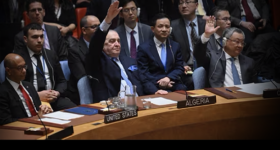
Dr. Can Erimtan
21st Century Wire
Sunday’s deadly terror attack in İstanbul’s fashionable and popular Beyoğlu district has hit the news headlines like the starting shot of a countdown to next year’s general elections …. The AKP government was quick to point the finger at Kurdish terrorist groups, the PKK and its affiliate the PYD. The Interior Minister Süleyman Soylu even said that the orders for the attack had come from Kobani, the Kurdish city in northern Syria just across the Turkish border.
The BBC summarised Sunday’s events as follows: “At least six people have been killed and 81 wounded in an explosion in a busy area of central Istanbul, Turkish authorities have said. The blast happened at about 16:20 local time (13:20 GMT) on Sunday [, 13 November 2022] on a shopping street in the Taksim Square area. A suspect has now been arrested, the interior minister said. Vice-President Fuat Oktay earlier said the blast was thought to be a terrorist attack carried out by a woman.” On Monday morning (14 November 2022), the Interior Minister Soylu explained in great detail that a woman had been sitting on a bench in the vicinity for about 40 minutes and that a few minutes after getting up to go the blast occurred, indicating that this woman had deposited an explosive device before disappearing in the ensuing crowd. Soylu then went on to say that the woman in question had been arrested and put into police custody. In a remarkable twist of words, the Interior Minister Soylu took his allegations way beyond Kobani (and Rojava) and way across the Atlantic: “We know where the attack was coordinated. We received the message given to us, and we know what the message was. We do not accept the condolences of the American embassy,” he said on CNN TÜRK.
For his part, President Recep Tayyip Erdoğan (whom I like to refer to as the Prez) said the perpetrators would be punished while speaking at a news conference in Istanbul, before getting on a plane bound for the G20 Summit in Indonesia. Before boarding, he condemned the blast as a “vile attack” and said that “a smell of terror” was in the air.
A Smell of Terror in the Air
The Prez’s words did sound ominous indeed, saying to the Turkish public at home that there was now “a smell of terror” in the air. And the timing of this year’s Beyoğlu blast also seems rather interesting: a fortnight after the 99th anniversary of the Republic foundation (29 October) and a few days after the commemoration of Atatürk‘s death (10 November), but also on the same day that the country’s supreme leader was bound to leave the country in the able hands of his surrogates – the AKP machinery led by Soylu and the Justice Minister Bekir Bozdağ. The former even personally fanning the flames of anti-Kurdish sentiment by referring to the city of Kobani and the PKK-PYD nexus. These coincidences appear like history repeating itself. Back in early May 2013, for instance, when two bomb attacks in the small city of Reyhanlı, on the Turco-Syrian border and known locally as “little Syria,” had Erdoğan then fly to the U.S. to meet President Obama (16 May 2013), while in June 2015, “elections . . . produced an unexpected outcome as voters appeared to oppose the one-party AKP rule and allowed the Kurdish their moment in the sun.” This was the first-ever chink in the AKP’s armour:
At the time, I wrote that the “worst case scenario for Turkey would now undoubtedly be unsuccessful coalition negotiations that would end in early elections in 45 days’ time”. As it turned out, the AKP was unable to countenance a return to the good old days of unlikely and unwieldy coalition governments and forced a re-run of the electoral contest on the strategic date of 1 November (coinciding with the holiday period accompanying the annual celebrations of Republic Day on 29 October). As it happens, 1 November also carries a special place in Turkey’s Kemalist mythology and historiography as Atatürk and the then -provisional Ankara government abolished the Ottoman Sultanate on that day in 1922. In fact, the main opposition newspaper Sözcü carried this item as the main headline on the day of th[e] election, reminding voters to keep Atatürk and his deeds in mind while casting ballots.
The Prez and his AKP cohorts carried the day, winning a whopping 49.50% of the popular vote. People were shocked and commentators lost for words, but two days before the momentous elections I told the business media company BNE IntelliNews that the AKP was likely to secure “45% [of the] votes.” The reasoning behind my prediction was clear, as I explained on 4 November 2015:
[T]he ruling AKP ha[d] made cunning use of the intervening not-quite five months [June-November 2015]. The Prez and [his PM Ahmet Davutoğlu] gave speech after speech admonishing voters to choose stability over insecurity. And, as if by happy coincidence, the terror threat posed by Kurdish nationalism and the PKK once again reared its ugly head forcing Turkey to take retaliatory military measures, inside the country as well as across the border on the grounds of the KRG in Northern Iraq. At the same time, next door’s not-so civil war in Syria managed to insert itself into Turkey’s frame as well, targeting the local Kurds and their political party the HDP. The terror attacks in Suruç (20 July 2015) and Ankara (10 October 2015) were quickly blamed on the Islamic State (IS) and led to a concerted government crackdown on sleeper cells in such diverse locations as Diyarbakır and Pendik. Even though the country’s Kurds and the HDP had been the primary targets of the IS attacks on Turkish soil, the main beneficiary was nevertheless the AKP.
The popular fear of terror attacks had inspired Turkey’s voting public to opt for continuity over change, to trust the Prez and his AKP machinery to defeat the terrorists – whatever ideological shape or form they might take. For, prior to November, 1st, “Tayyip Erdogan spoke [over and again] about the fact that the PKK and its Syrian ally the PYD were the same as the Caliph and his IS [commonly known as ISIS, in the West].” The “smell of terror” in the air had convinced a majority of the Turkish electorate to vote for stability over insecurity in 2015, thereby assuring a landslide return to power of the AKP. At the time, I termed this expectedly unexpected outcome, ‘Turkey’s November Surprise,’ which secured a clear mandate for a post-Kemalist century.
Real or Imagined or Manufactured Terror Threats
The post-Kemalist century seems set to continue its course, after all the AKP establishment has over the past years successfully dismantled nearly all of Atatürk‘s accomplishments and the supposedly Kemalist opposition is today equally at ease in using an Islamic rhetoric to appeal to the Turkish public – the opposition Mayor of İstanbul being all but an Islamist wolf in sheep’s clothing. The economic crisis of the past years, however, seems to cast doubt on the electoral viability of the Prez and his AKP henchmen. And that is where the sudden revival of a real or imagined or manufactured terror threat appears highly significant. Will terror threats and/or attacks continue into the coming year, thereby forcing the AKP-led government to act decisively in violently suppressing either Kurdish and/or Islamist terrorists?! That seems to be Erdoğan’s hope, as his above-quoted words uttered before leaving the country seem to indicate. I would argue that his insinuation that the public will now once again have to learn how to live with the “smell of terror” in the air all but denotes that his personal instincts indicate that the coming weeks and months will witness news cycles filled with stories about thwarted terror attacks and ‘neutralized’ terrorists on home soil or across the border.
Even the esteemed New York Times seems to toe the party line in this context, saying that the “Turkish state has been at war for decades with Kurdish militants based in the country’s southeast . . . And jihadists who belonged to or were inspired by the Islamic State.” Following Turkey’s November Surprise, the country seems to have been rather free of serious terror attacks – between 2011 and 17, the country “was targeted 87 times by 9 different terror organizations.” The original Beyoğlu blast took place on 19 March 2016, targeting a tourist group on İstiklal Caddesı, when a suicide bomber was able to kill 4 Israeli nationals and injure 36 other bystanders. Now, more than six years later, another Beyoğlu blast has reawakened public fear in Turkey. Before boarding his Indonesia-bound plane, the Prez told reporters that “[e]fforts to make Turkey and the Turkish nation surrender by terror will not reach their aim today, as they did not in the past.” This determination all but shows that he is getting ready for the long haul, that the AKP is more than ready to tackle any configuration of PKK-PYD-ISIS terrorists (apparently bent on securing an easy electoral victory for the Prez in the significant centenary year of the Turkish Republic’s foundation).
For the AKP establishment feels that only success in next year’s elections is possible and necessary, necessary “in order to achieve” the AKP’s “very own Hedef 2023, as [the party] named [its] manifesto containing practical goals and targets – practical goals and targets that are but prerequisites for achieving the unspoken aim of the transformation of the Turkish nation into a state once again beholden to the religion of Islam and regulated by Sharia law on the centenary of the foundation of the Republic of Turkey,” as I have written last July.
Will the Prez’s plans work again this time around? Will 2023 see a re-run of 2015? And will a possible AKP victory lead to re-definition of the Turkish state along a Sharia line?
***
21WIRE special contributor Dr. Can Erimtan is an independent historian and geo-political analyst who used to live in Istanbul. At present, he is in self-imposed exile from Turkey. He has a wide interest in the politics, history and culture of the Balkans, the greater Middle East, and the world beyond. He attended the VUB in Brussels and did his graduate work at the universities of Essex and Oxford. In Oxford, Erimtan was a member of Lady Margaret Hall and he obtained his doctorate in Modern History in 2002. His publications include the revisionist monograph “Ottomans Looking West?” as well as numerous scholarly articles. In Istanbul, Erimtan started publishing in the English language Turkish press, culminating in him becoming the Turkey Editor of the İstanbul Gazette. Subsequently, he commenced writing for RT Op-Edge, NEO, and finally, the 21st Century Wire. You can find him on Twitter at @TheErimtanAngle. Read Can’s archive here.
SEE MORE TURKEY NEWS AT: 21st Century Wire Turkey Files
ALSO JOIN OUR TELEGRAM CHANNEL
PLEASE HELP SUPPORT OUR INDEPENDENT MEDIA PLATFORM HERE

Get Clive de Carle's Natural Health essentials of the finest quality, including vitamin & mineral supplements here.















